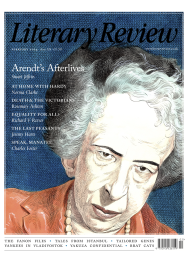Esme Bright
On the Job
Green Dot
By Madeleine Gray
Weidenfeld & Nicolson 384pp £18.99
Overeducated and under-stimulated, Hera, twenty-four, finally admits that it is time, after three arts degrees, to leave education and get a job. Despite her determination to dress it up as research, an experiment to see if she can blend in without being recognised as ‘a chaotic fleshbag in a navy dress’, work turns out to be exactly as she expected. She is exasperated by her boring colleagues and tedious job: ‘I want to die but, devastatingly, this does not occur. I am very much alive, and I am sitting on a rolling chair.’ That is, until she spots Arthur and their office flirtation turns into an all-consuming affair.
The sardonic Hera becomes intoxicated by her feelings, abdicates all agency and patiently waits for him to divorce his wife, hoping ‘to snuggle in with him, into his life couch’. But we know, as Hera does deep down, that this isn’t going to happen. Arthur will never leave his wife.
Some

Sign Up to our newsletter
Receive free articles, highlights from the archive, news, details of prizes, and much more.@Lit_Review
Follow Literary Review on Twitter
Twitter Feed
Under its longest-serving editor, Graydon Carter, Vanity Fair was that rare thing – a New York society magazine that published serious journalism.
@PeterPeteryork looks at what Carter got right.
Peter York - Deluxe Editions
Peter York: Deluxe Editions - When the Going Was Good: An Editor’s Adventures During the Last Golden Age of Magazines by Graydon Carter
literaryreview.co.uk
Henry James returned to America in 1904 with three objectives: to see his brother William, to deliver a series of lectures on Balzac, and to gather material for a pair of books about modern America.
Peter Rose follows James out west.
Peter Rose - The Restless Analyst
Peter Rose: The Restless Analyst - Henry James Comes Home: Rediscovering America in the Gilded Age by Peter Brooks...
literaryreview.co.uk
Vladimir Putin served his apprenticeship in the KGB toward the end of the Cold War, a period during which Western societies were infiltrated by so-called 'illegals'.
Piers Brendon examines how the culture of Soviet spycraft shaped his thinking.
Piers Brendon - Tinker, Tailor, Sleeper, Troll
Piers Brendon: Tinker, Tailor, Sleeper, Troll - The Illegals: Russia’s Most Audacious Spies and the Plot to Infiltrate the West by Shaun Walker
literaryreview.co.uk